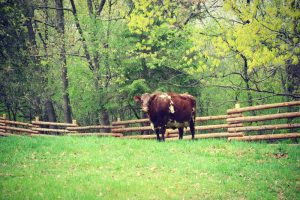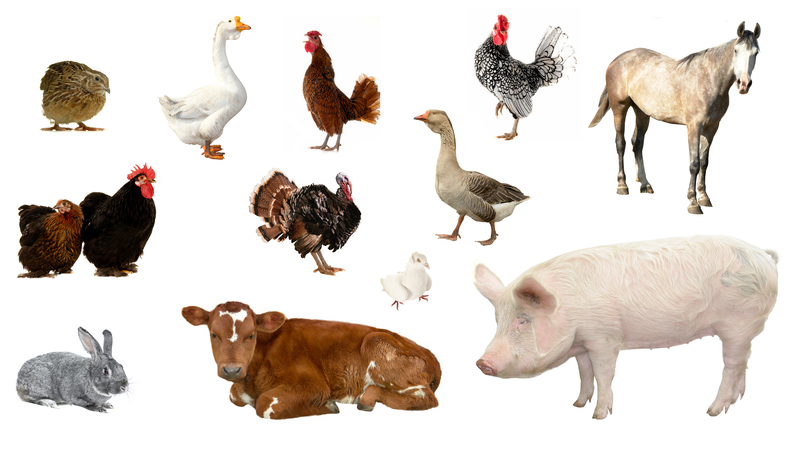A farm or homestead without livestock seems unusual, to say the least. Whether you see yourself with a flock of cheerful chickens, a herd of graceful goats or a few calming cows, livestock are a valuable food source that should be planned for carefully, then cared for consistently.
Are You Ready to Be Available Every Minute of Every Day?
Are you prepared to be “on-call” for your animals 24 hours a day, 7 days a week, 365 days a year? When you enter the world of livestock, a few things to be aware of are:
- Newborns usually come in the middle of the night.
- Orphaned or abandoned babies will need you to feed them around the clock.
- Escaped animals and flattened fencing will need attending to immediately, even in 110o F heat.
Just like having kids, keeping livestock can tie you down in ways you can’t even imagine. And, they won’t eventually grow up and learn how to take care of themselves like kids will.
Basic Ownership Preparation and Considerations
Before you add animals to your homestead, evaluate your situation and skills to see if you have what you need to support the new lives coming in. The following points will help you in your evaluation.
Research, research, research-Knowledge is power! Educate yourself on each of your options before you make any purchases.
Talk to the Local Vet-Find out what animals the veterinarians in your area are qualified to treat. This info alone can go a long way in helping you decide what livestock to get.
Similar Article: “Are You Ready for Livestock?”
Look for a Soul Mate-If you have a loud and abrupt personality, and so does your livestock, you could easily run into more issues than you want to deal with. Assess yourself and research compatible animals. In the same breath, many species require brute strength to safely interact with them, make sure you don’t take on more than you can handle.
Enjoy the Animals-You must honestly take pleasure working with the kind of livestock you choose.
Have Their New Home Ready and Waiting-Make sure you have ample land, structures, and resources before you finally bring them home.
So, What Are Your Options?
Here is some basic info on the most common livestock homesteaders consider when adding to their property.
Beef Cattle
Beef cattle are low maintenance and don’t need complex facilities. Most people are able to handle cattle with minimum issues and local vets can usually treat them. If you decide to go the milk cattle route, you will need to make sure you have the proper equipment to handle the milking process and storage.

Goats
According to a publication by Florida A&M University, 70% percent of the world population eats goat regularly. If that’s not to your fancy, dairy products like goat milk and cheese are another good protein source. Additionally, known to eat just about anything, you can picket them or corral them in a different area each day and never have to mow your lawn again.
Rabbits
Whether for meat, fiber, or just to have as a pet, rabbits can bring a lot to a homestead. Just don’t go too far too fast. Proceed carefully and know your limits. And, keep the males away from the females unless you want your “herd” to expand exponentially.
Related Article: “Beginners Guide to Buying Rabbits”
So, whether you go small, medium, or large, make sure you are thoroughly prepared to take on the challenges adding livestock to your way of life can produce.
Chickens
Chickens need very little besides food, water, a safe place to sleep, and a few hours from you each week to gather eggs and clean the roosts. For that relatively little amount of effort, you will be rewarded with fresh eggs and roast chicken on Sundays (or Mondays, or Tuesdays….)
If chickens are your choice, I suggest taking a look at this guide to building the perfect chicken coops to protect your new friends and future food source <<<Click Here>>>
Pigs
Pigs are one of the easiest animals for your homestead because they will eat literally anything, they will be your living compost. No need to throw away and waste anything edible, your pigs will take care of that.
They are also great at killing parasites that may harm you other livestock, they have different internal parasites that can digest other animal parasites. Let them graze with your other animals to help clean up the pasture and keep everyone healthy.
The obvious reason would be the delicious meat such as ham, sausage, and bacon.
In conclusion, livestock is a great source for food if a self-sustaining homestead is what you are looking for. Even though it may take some time, research and hard work, the end result will be worth it.
Here are some other food options for your “Survival Farm”


